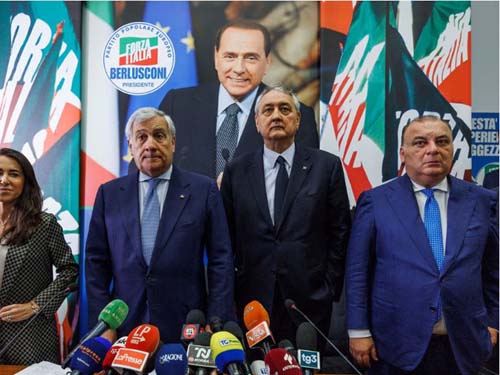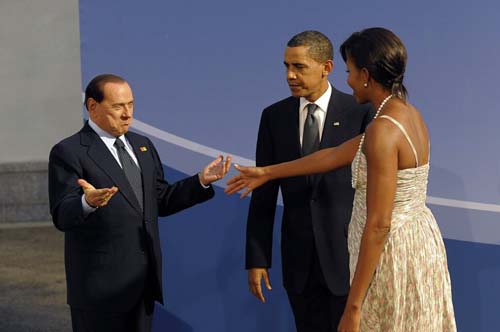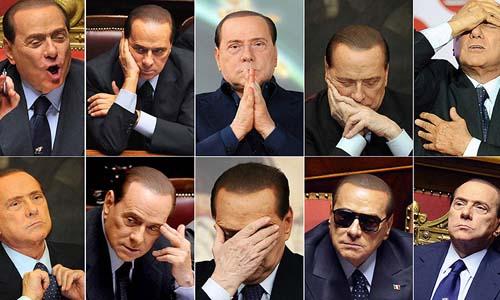
The life of Silvio Berlusconi
Silvio Berlusconi, (born September 29, 1936, Milan, Italy—died June 12, 2023, Milan), Italian media tycoon who served three times as prime minister of Italy (1994, 2001–06, and 2008–11).
Early life and first term as prime ministerAfter graduating from the University of Milan with a degree in law, Berlusconi became a real-estate developer, amassing a considerable fortune by the 1970s. He created the cable television firm Telemilano in 1974 and four years later mounted the first direct challenge to the national television monopoly. In 1980 he established Canale 5, Italy’s first commercial television network, and by the end of the decade Berlusconi-created stations dominated Italian airwaves. Berlusconi also diversified his business

holdings, acquiring department stores, movie theatres, publishing companies, and the AC Milan football team. He consolidated his empire under the umbrella of the Fininvest holding company, a vast conglomerate that grew to control more than 150 businesses.
In 1994 Berlusconi founded Forza Italia (“Go, Italy!”), a conservative political party, and was elected prime minister. His tenure proved turbulent. Shortly after he took office in May 1994, officials launched a corruption investigation into his business empire, and disputes within the governing coalition culminated in the Lega Nord (Northern League) party’s defection in December.
Facing a no-confidence vote, Berlusconi announced his resignation on December 22, 1994, but stayed on in a caretaker capacity until January 1995. He was later convicted of fraud and corruption, but the verdicts were eventually overturned. Despite these charges and criticism of his control of much of the Italian media, he remained the leader of Forza Italia. Promising tax cuts, more jobs, and higher pensions, he led a centre-right coalition to victory in the 2001 national parliamentary elections and again became prime minister.

Once in office, Berlusconi faced a number of challenges. Berlusconi faced criticism as the country’s economy continued to struggle. After his coalition fared poorly in regional elections in 2005, Berlusconi resigned and won a vote of confidence in parliament. He subsequently formed a new government. In April 2006 he ran for reelection, but his coalition was defeated by a centre-left bloc headed by Romano Prodi. Berlusconi challenged the results, and an Italian court later upheld Prodi’s victory.
Berlusconi resigned in May. Less than two years later, however, Prodi stepped down after losing a confidence vote. In the national elections held in April 2008, Berlusconi—at the helm of a new party known as the People of Freedom (Popolo della Libertà; PdL)—won a third term as prime minister. He and his centre-right cabinet took office in May.
On September 28, 2013, just days before a committee was set to rule on the matter of his expulsion from the Senate, Berlusconi withdrew the PdL from the Letta government, ostensibly in response to a proposed 1 percent value-added tax increase. As Letta’s five-month-old administration appeared to be on the verge of collapse, Berlusconi faced a revolt from within, as dozens of PdL lawmakers pledged their support for the government. Berlusconi abruptly reversed himself, and on October 2, 2013, with the PdL once again participating in the governing coalition, Letta easily survived a vote of confidence. Later that month Berlusconi relaunched the PdL as Forza Italia. The party’s moderate wing, which had sided with Letta and forced Berlusconi’s volte-face, subsequently broke away under the leadership of Angelino Alfano to become the New Centre Right (Nuovo Centrodestra; NCD) party.
As a final ruling on Berlusconi’s Senate membership loomed, he once again withdrew his support from the government, moving Forza Italia into opposition. Letta comfortably survived the resulting confidence vote with the support of the NCD. After months of delays, on November 27, 2013, the Senate voted to formally expel Berlusconi. The decision carried with it a six-year prohibition on holding public office, a sentence that trumped the earlier political ban, and stripped Berlusconi of the prosecutorial immunity that he had enjoyed as a lawmaker.
Although no longer holding a legislative seat and barred from holding office until 2019, Berlusconi continued to serve as the head of Forza Italia and vowed to remain a fixture in the Italian political scene. He was briefly sidelined by heart surgery in June 2016, but, within months, Berlusconi was once again using his media empire to influence the Italian electorate. PD Prime Minister Matteo Renzi had proposed a constitutional referendum that promised to significantly reduce the power of the Senate, and early polling indicated that Forza Italia members were open to the proposal. Berlusconi came out strongly against the referendum, however, and it was overwhelmingly defeated in December 2016. Renzi resigned, and his successor, Paolo Gentiloni, led a caretaker government into elections that were scheduled for March 2018.
Political comebackA resurgent Berlusconi led a coalition of his own Forza Italia, the anti-immigrant Northern League (Lega Nord), and the neofascist Brothers of Italy to victory in Sicily in November 2017. Berlusconi’s coalition narrowly topped the Five Star Movement but convincingly defeated the PD, dimming the hopes of a comeback by Renzi. Just weeks after his victory in Sicily, the 81-year-old Berlusconi appealed to the European Court of Human Rights in an effort to overturn his ban from holding political office. In the general election on March 4, 2018, Berlusconi’s coalition captured the largest share of the vote, narrowly topping Five Star, though Forza Italia finished behind Lega, a result that reflected Italian voters’ general dissatisfaction with mainstream parties. Months of debate failed to yield a government, however.
In May 2018, just days after Berlusconi agreed to allow Lega to open discussions with Five Star, a Milan appellate court overturned his ban from political office. Lega and Five Star eventually succeeded in forming a government, and Lega leader Matteo Salvini was named interior minister. Salvini used his position to advance a nativist Euroskeptic platform, and he quickly emerged as the most visible face on the Italian right. Berlusconi, however, continued to pursue a political comeback by tacking to the centre and promoting a pro-EU agenda. Although dogged by health issues, Berlusconi left the hospital after abdominal surgery to resume his campaign for a seat in the European Parliament. In May 2019 Forza Italia significantly outperformed expectations, and Berlusconi handily won his first electoral contest since the lifting of his political ban.
